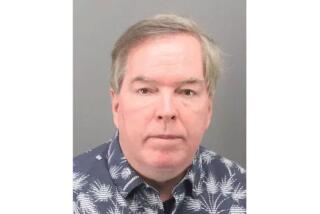Arrests Offer Glimpse Into Software Piracy : Computer: Officials in San Gabriel Valley case indicate that hackers are not necessarily geniuses.
- Share via
What does it take to pirate $4.7 million worth of computer software? As Microsoft and authorities recently discovered in a San Gabriel Valley case, it doesn’t take the twisted genius of a dark-side hacker.
A little computer literacy, a nest egg to get started and the cooperation of printers, forgers and hologram makers will do the trick, according to law enforcement officials who busted one such alleged operation in the west San Gabriel Valley.
Six men were arrested in February after a six-month investigation by Los Angeles County sheriff’s deputies who used an undercover officer to sell counterfeit holograms to the suspects. A series of raids netted more than $4.7 million in software and equipment, the largest cache of counterfeit Microsoft programs found in the United States to date.
A closer look at this alleged band of pirates, most of whom have no previous criminal records, offers insight into the threat posed by the spread of sophisticated software piracy from Asia to the United States.
“This wasn’t just a bunch of computer nerds messing around in their garage,” said Thomas Budds, a sheriff’s detective on the Asian organized crime squad. “There are ties to Taiwan and Mainland China.”
Defendant Kim Fong Chean, 24, is from a lower-middle class family that emigrated from Burma about 18 years ago. He lives in Temple City, studied international business at Cal State Los Angeles and now works at a computer data firm.
Also in custody are Chean’s brother, Kim Fee Chean, 26, of Los Angeles; Joseph Oh Yuen Lee, 27, of Alhambra; Lung Sheng Yang, 30 of Monterey Park, and two more brothers--Chew Ping Kwan, 25, and Gin Ping Kwan, 26.
All six were indicted on March 10 by a grand jury on felony counterfeiting charges, which carry a penalty of up to 10 years. All are in custody on $700,000 bail, which their attorneys have protested as outrageous. Defense attorneys say their clients are clean-cut, law-abiding young men who are being demonized because they are Asian and because they ran afoul of Microsoft, a U.S. software giant.
“They are scapegoating immigrants and people of color for the economic woes of this country,” said Michael Yamamoto, Kim Fee Chean’s attorney. “This represents a trend of powerful economic interests having their way prosecutorially as well as politically and economically.”
Nonsense, say Microsoft officials.
As related in court documents, the sting started in July of 1994 when a young Asian man approached several hologram makers and proposed to buy 30,000 counterfeit Microsoft holograms.
One vendor went to police, agreeing to cooperate in an undercover investigation. By tapping his phone, authorities were able to trace the calls to three locations, including the Chean house in Los Angeles, according to court records.
Meanwhile, Jess Bembry of the Sheriff’s Asian organized crime squad flew to Microsoft’s Redmond, Wash., headquarters. There, officials showed him how to identify counterfeit products. For instance, the diameters of some counterfeit holograms are about .05 of an inch smaller than authentic ones, according to court documents.
Holograms, three-dimensional images produced by lasers, are expensive and difficult to reproduce. They are used on software packaging as a mark of authenticity. The software itself can be pirated simply by copying a program using a personal computer.
Microsoft provided Bembry with 5,000 altered holograms for use in the sting. Posing as a hologram maker, Bembry met several times with Kim Fee Chean at a Denny’s restaurant in Hacienda Heights and agreed to sell Chean holograms for the DOS 6.2 software at $1.25 each, according to court documents. Chean allegedly said he needed the material quickly because another counterfeiter was about to come out with the same product.
On Feb. 15, Bembry delivered 5,000 holograms and received $7,750 from Chean, who then handed the holograms to his brother, Kim Fong Chean, according to detectives, who then arrested the brothers.
Meanwhile, surveillance of the brothers and traced phone records led to seven locations where police discovered the equipment for a counterfeit software lab: disk duplicating equipment, photocopy machines, shrink wrap-machines, photographic plates and computers. Also found were 50,000 counterfeit certificates of authenticity, 37,000 blank computer disks, $64,000 in cash, three handguns and an assault rifle.
More to Read
Sign up for Essential California
The most important California stories and recommendations in your inbox every morning.
You may occasionally receive promotional content from the Los Angeles Times.










